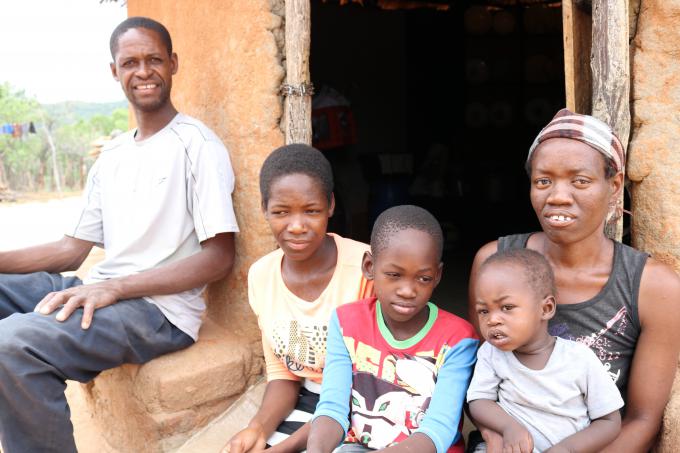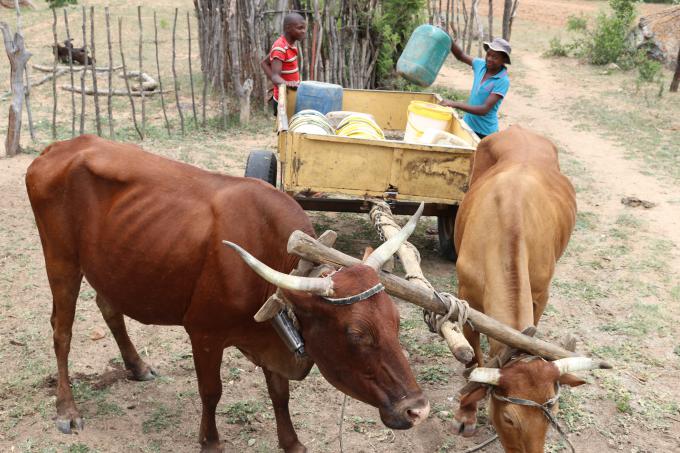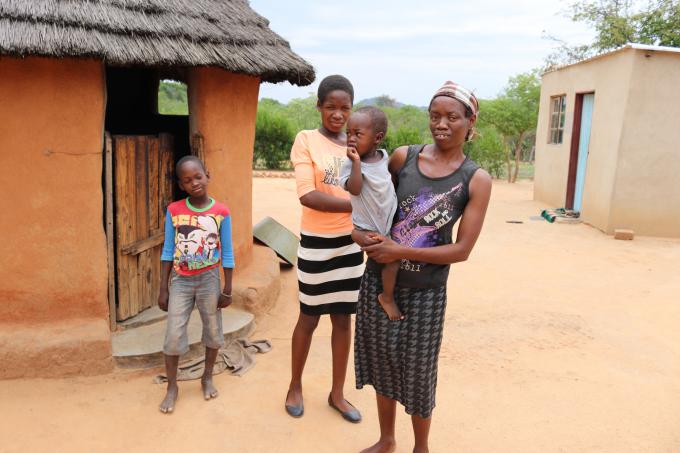Impact of Climate Change on Food Security in Zimbabwe
Deputy (35), lives in the remote Matobo district in Zimbabwe with her husband Mlungisi and her three children, Millicent (15), Menford (11) and Milton (19months). The past years have been accompanied by disasters which have seen the family struggling to get food. Agriculture which is the main source of livelihood for rural communities has been impacted by climate change, leaving most families vulnerable to hunger.Deputy and her family have not been spared. She explains how the family failed to harvest anything after their crops wilted due to the scorching sun:
“Last year, the first rains came in October and we ploughed maize, groundnuts’ and round nuts. The rains however stopped when our crops were almost ready for harvest and all crops were burnt by the sun leaving us with nothing to harvest.” “We have experienced two consecutive years of drought. We depend on farming to get food and we haven’t been able to harvest much from the fields. We now survive on doing menial jobs for people who give us a bucket of maize or money in return.”
The effects of climate change are visible in rural Zimbabwe, with most rural communities facing food insecurity, water scarcity and loss of livestock. Deputy says that the rainfall patterns in her district have change and it’s now overly hotter than before.
“The rainfall pattern is now unpredictable and it’s now hotter than before. It rains during the farming season but when we are about to harvest it doesn’t rain, leaving crops to burn. We now harvest nothing or close to nothing. We get to mid-year with no food in the barns to eat. In the past years, it would start raining in October. We would harvest in April and the food was enough food to last us until the next farming season. It’s different now.”
“We recently planted maize and groundnuts when it rained, but it’s a gamble. We don’t know if we will harvest anything next year because it hasn’t rained much this year." Said Deputy.
Due to high temperatures, water scarcity has become a common phenomenon and most families in Matobo District have to travel long distances to fetch water. Deputy and her family fetch water from a well which is about 3 kilometers away from their homestead.
“The borehole close to our homestead dried up and we now fetch water at a well which is about 3 kilometers away. Walking such a long distance is tiring and sometimes you get to the well at 11am only to fetch water at 4pm because of long queues. At times the water gets finished and we have to wait for it to seep through the well until it fills up again. It’s the only well in our community so everyone fetches water there.”
“Livestock from our village drink water at a dam which is about 10 kilometers away. We don’t have livestock but our neighbor who does lost two cattle. They got stuck in the mud whilst looking for water and died.”
Years ago, communities in Matobo District, used to practice rain making ceremonies at the Njelele Shrine, which is located in the Matopo Hills to appease ancestors so that they bless the community with rains. Deputy and her husband say the younger generations no longer follows those customs and it could be the reason why it no longer rains.
Supporting Communities in Crises
The unprecedented food crisis in Matobo and many other districts across Zimbabwe, driven by climate-related disasters including widespread drought has forced many families to take desperate measures to survive such as reducing their daily meal intake, selling off livestock and other assets, migrating unsafely to other countries and taking their children out of school to work. In addition, the country is also grappling to cope with the COVID-19 emergency, amid a food crisis and a failing economy.
Through financial support from ECHO, Save the Children in partnership with International Rescue Committee is supporting vulnerable and food insecure households through cash transfers, under the Safe Multipurpose Assistance to Communities in Crises in Zimbabwe project. It is being implemented in Mbire, Matobo, Beitbridge, Chipinge and Chimanimani districts. Deputy and her family are enrolled on this programme and have been receiving USD65 per month, for the past 2 months.
“We were selected to receive assistance from ECHO in September this year. My son Menford is blind, that is one of the reasons why we were selected because they said the program also caters for the disabled who come from poor families.”
“My whole family was registered and every month, we receive USD65. We now buy mealie meal, cooking oil, sugar, soap, soya chunks, sour milk and cabbage. The food lasts us the whole month.”
“We are grateful for the assistance we are receiving from ECHO through Save the Children. We had reached a point where we would wake up without a clue about what we were going to eat on that day. We were no longer eating vegetables cooked with cooking oil because we just couldn’t afford it.” “It was a struggle. Sometimes we would go to bed hungry. There is a huge difference now. We now eat three times a day and we are grateful.” Deputy alluded.
The cash transfer project which started in September 2020 is benefitting 4739 vulnerable households with child heads, the elderly, chronically ill, disabled, pregnant and lactating mothers and orphans across the five districts. Beneficiaries will receive money to buy groceries which include food, toiletries and other essentials for their protection from COVID-19 every month until June 2021.
 Zimbabwe
Zimbabwe 

